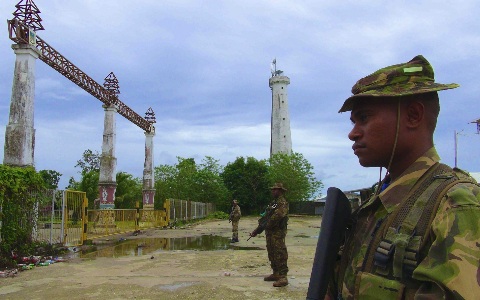The construction of a K90 million base on the PNG-Indonesia border has been put on hold indefinitely after clashes, 10 days ago, between Indonesian troops and a faction of the Free Papua Movement or the OPM.
At least a day before the attack, intelligence obtained by the Papua New Guinea Defence Force prompted an evacuation of government workers as well as contractors working on the facility on the PNG side of the border.
On Saturday, 5th April, about 15 OPM fighters, dressed in battle fatigues, arrived from the jungle covered south and raised the West Papuan Morning Star as well as two UN flags.
As a political declaration was read out in Bahasa, armed fighters set fire to the nearby Indonesian quarantine facility and began firing at an Indonesian observation post about a hundred meters away.
The attack was aimed at disrupting the Indonesian provincial elections and provoking a response from a company of Indonesian soldiers located about 200 meters from the PNG side.
The attack comes after a lull in armed rebel activity in recent years. Two days later, a statement by OPM leader, Mathias Wenda, declared a revival of the West Papuan struggle. In what was reminiscent of the 70s and 80s, the statement names 10 regional commands stretching from Sorong at the tip of the Papua province to the border areas shared with Papua New Guinea.
While much of the global community remains reserved or indifferent to the West Papua concern, the OPM spokesperson who agreed to a recorded interview with EMTV, echoed a long held sentiment of independence, cultural identity and a plea for the global community to pay attention to Indonesian atrocities in West Papua.
“We are fighting for our identity,” say Timothy Wenda. “Soon my people will be gone. We want the global community to recognize what’s going on in West Papua.
Wenda is Papua New Guinean by birth and West Papuan by blood. His Wamena people have a fifty year history of armed confrontations with the Indonesian military.
“Indonesia doesn’t just kill up with guns. They kill us with through many other ways.”
Over the last 20 years, Indonesia has tried to move away from the image of the tough enforcer of its rule to one that is more diplomatic. The Indonesian consul in Vanimo, Jahar Gultom, says it is a difficult task to unite a country that is as culturally diverse and complex as Papua New Guinea.
“There are weaknesses,” says Jahar Gultom. “But Indonesia is working to find a way forward.
“Indonesia is a difficult country to manage. It has more than 500 ethnicities.”
In recent years, Indonesian diplomacy has convinced countries like Vanuatu – a strong supporter of the Papuan struggle – and organizations like the MSG to take a more moderate approach.
All this comes against a backdrop of evidence on social media that tell another story – a story of continuing military atrocities in Papua.
“We are working through all of this,” says Gultom. “These days we can never hide what goes on. But we remain open to dialogue.”


